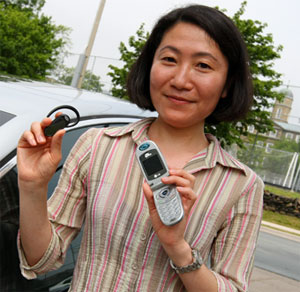 |
| H¬ĢĽ≠ PhD student Yoko Ishigami asks "Is a hands-free phone safer than a hand-held phone?" (Nick Pearce Photo) |
Since April 1 when Nova Scotia outlawed the use of hand-held cellphones while driving, sales of hands-free devices have gone through the roof. It seems everyone‚Äôs driving‚ÄĒeven walking‚ÄĒwith tiny electronic devices tucked into their ears.
Conventional wisdom says they’re safer. With wireless technology such as Bluetooth becoming commonplace, you can still conduct business, order pizza or talk to mom while keeping both hands on the wheel.
But is the mind on the road? A H¬ĢĽ≠ PhD student in experimental psychology says hands-free cellphones are not safer and indeed may even be more dangerous than hand-held.
Killam scholar Yoko Ishigami presented her paper, ‚ÄúIs a hands-free phone safer than a hand-held phone?‚ÄĚ at the national conference of the Canadian Association of Road Safety Professionals held last month in Whistler, B.C. She was awarded first place in a national student paper competition.
‚ÄúTalking and listening are such complicated tasks, especially if you‚Äôre thinking ahead to what you‚Äôre going to say,‚ÄĚ says Ms. Ishigami, an international student from Shizuoka, Japan. ‚ÄúThe conversation is what takes all your attention.‚ÄĚ
She surveyed current scientific research on cellphone use, showing that talking on the phone, regardless of phone type, has negative impacts on performance, especially when the driver is confronted by complex or unpredictable situations. Performance while using a hands-free phone was rarely found to be better than that using a hand-held phone.
Some studies found drivers compensate for the harmful effects of cellphone use when using a hand-held phone‚ÄĒby driving slower or pulling over to finish a call‚ÄĒbut neglect to do so when using a hands-free phone.
‚ÄúPeople tend to be overconfident with hands-free and drive faster. They‚Äôre thinking, ‚ÄėI‚Äôm OK because I‚Äôve got on the headgear,‚ÄĚ she explains. ‚ÄúWhereas if they were driving with a hand-held phone, they tend to drive slower.‚ÄĚ
Ms. Ishigami says the topic of cellphone use while driving has interested her since she was an undergraduate psychology student at the University of Victoria. She recalls being at a pedestrian crosswalk ready to cross the road as a car approached. Locking eyes with the driver, she proceeded across, but had to jump back to curb when she realized the driver wasn’t going to stop. The driver, who was holding up a phone to her ear, didn’t even see her.
‚ÄúWhen you‚Äôre talking on the phone, your attention is on the conversation. You may be looking at things but that doesn‚Äôt mean you‚Äôre processing that information.‚ÄĚ
One Canadian study Ms. Ishigami reviewed demonstrated that talking on a cellphone while driving increased the risk of an accident four-fold, and that whether the phone was hand held or hands free made no difference to the risk. Considering all the research, she concludes all cellphone use while driving should be banned.
So far, Newfoundland and Labrador, Quebec and Nova Scotia in Canada, and California, Connecticut, New Jersey, New York and Washington in United States have banned hand-held cellphones while driving. India may be the only country in the world which bans both hand-held and hands-free phones while driving.
In Nova Scotia, penalties, including court costs, are just under $165 for a first offence. In Newfoundland and Labrador, the first province to enact a cellphone law in 2003, fines can be as high as $400, plus demerit points. Ontario is considering similar legislation to stop drivers from using cellphones and BlackBerrys while behind the wheel.
‚ÄúI think what‚Äôs troubling is that hands-free devices are rarely banned, and indeed even encouraged,‚ÄĚ says Ms. Ishigami.
Dalhouse psychology professor Raymond Klein hopes legislators will pay attention to Ms. Ishigami’s research.
‚ÄúNo one should be surprised that driving while talking on a cellphone is dangerous. But finding that this danger is not much reduced, or reduced at all, by using a hands-free phone is news,‚ÄĚ says Dr. Klein. ‚ÄúIt is correct but incomplete to think ‚Äėwe drive with our hands‚Äô and therefore using them for another activity (dialing, eating, etcetera) might be unsafe. We drive with our minds too ‚Ķ and it‚Äôs essential that our attention is devoted entirely to the task of driving.‚ÄĚ
TAKE THE TEST:
